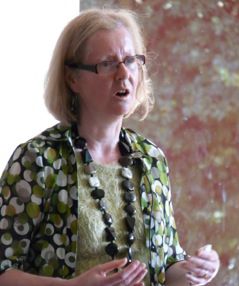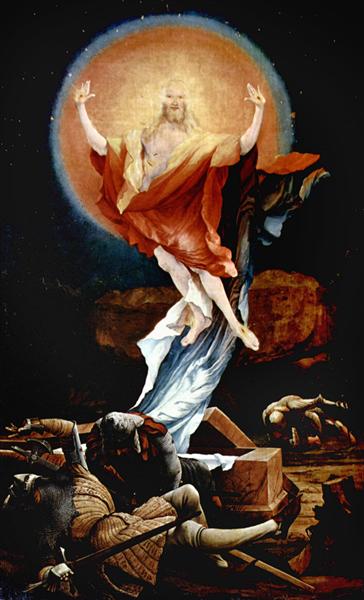Center for Practical Theology welcomes Professor Nicola Slee

The Center for Practical Theology and the School of Theology Dean’s Office were delighted to welcome Professor Nicola Slee to the School of Theology in February. Professor Slee is Director of Research at The Queen’s Foundation for Ecumenical Theological Education and Professor of Feminist Practical Theology (the Queen’s chair) at The Vrije Universiteit Amsterdam. At her lecture “Seeking the Risen Christa,” she introduced the audience to the decades-long quest by artists, theologians, and laypersons from a variety of backgrounds to re-image Christa in more contextual ways, including as “Christa.” Many interested in feminist Christology and expansive theological language have explored the power of imaging Christ as Christa.
Re-imaging Christ as Christa encourages reflection on the divine feminine as a counter to patriarchal religious symbols. As a feminist Christian proposal, those who engage the Christa seek to take a more expansive view of the gender of Christ, de-center the significance of Jesus/Christ within a wider model of God/Trinity, and challenge male dominance in Christian symbolism and theology, as has been done with theological projects focusing on a feminine Spirit or a renewed place for Mary. The recent exhibit The Christa Project: Manifesting Divine Bodies, featuring twenty two artists’ renditions of Christa at St. John the Divine Cathedral in New York City, is one recent example of these theologically-rich and tradition-expanding initiatives. There, the project was embraced as an opportunity for “exploring the language, symbolism, art, and ritual associated with the historic concept of the Christ image and the divine as manifested in every person—across all genders, races, ethnicities, sexual orientations, and abilities.”

Professor Slee traced the historical past of Christa by making connections with biblical narratives, such as Wisdom being portrayed with feminine imagery throughout the Bible, or of Wisdom being portrayed in the gospels of John. She also pointed to other traditions in Christian theology, including strains that introduce an incognito Christ or that emphasize androgynous depictions of Christ in art. Other important strains include reminders that the church remaining on earth after Christ’s ascension is a body that can take many different forms and that assumes multiple racial and gendered identities.
Professor Slee introduced several artistic depictions of the Christa or more feminine images of God or Jesus. These included Janet Mackenzie’s “Jesus of the People,” Edwina Sandys’s 1975 “Christa,” and the Resurrection panel from the Isenheim Altarpiece by Matthias Grünwald (pictured above right). Profsesor Slee’s interest in the risen Christa was sparked after a Triduum retreat where participants reflected on the image of the Christa and found themselves asking why there were not more images of a resurrected Christa as opposed to images of the suffering, crucified Christa. She emphasized that imaging Christ must always involve pushing boundaries of established ideas and impressions.
Professor Slee exp lained that images of a risen Christa have been developed but are not widely circulated in the mainstream. In Seeking the Risen Christa, she writes, “I am in search of symbols of the feminine divine which can speak to and of women’s risenness, strength, power, vitality and liveliness, our quest for life in all its fullness – without ignoring or obliterating the wounds and without denying the realities of evil, sin, and death (24).” Professor Slee closed by pointing to the cover image from her book, which features the work “Emmaus” by Emmanuel Garibay. Here, Jesus gathers around the table with friends, laughing, wearing a bright red dress, with the wounds in her hands visible as well.
lained that images of a risen Christa have been developed but are not widely circulated in the mainstream. In Seeking the Risen Christa, she writes, “I am in search of symbols of the feminine divine which can speak to and of women’s risenness, strength, power, vitality and liveliness, our quest for life in all its fullness – without ignoring or obliterating the wounds and without denying the realities of evil, sin, and death (24).” Professor Slee closed by pointing to the cover image from her book, which features the work “Emmaus” by Emmanuel Garibay. Here, Jesus gathers around the table with friends, laughing, wearing a bright red dress, with the wounds in her hands visible as well.

Professor Slee also spoke with a group of Practical Theology doctoral students and faculty on “Poetry as Feminist Research Methodology.” She explored how poetry has become a research methodology she uses to analyze and engage qualitative data from interviews with women about their faith lives. Incorporating poetry as a genre for reflecting on narrative and experience adds creative and critical dimensions to practical theological research. Her work resonated with many in attendance who are considering questions of voice, agency, and power in their research initiatives.